
Gavin McInnes and the threat of Western culture: the metapolitics of the 'anti-woke discourse'
Gavin McInnes is a far-right provocateur and Western chauvinist. He calls himself “a champion of Western values” (Feuer, 2021) and can be defined as a radical ethnocultural nationalist. As The New York Times describes, he “reserves a burning fire for the political correctness of people on the left whom he describes as busybodies who have lost their sense of humor” (Feuer, 2021). This is why one of its main battlefields is the 'anti-woke discourse', to which he devotes a large part of its content.
He started out as a relevant figure within the alt-right. However, the alt-right members categorized him as “alt-light” in 2016 and he distanced from it in 2017. He prefers the term “New Right”: “Alt Light is a gay term that sounds like a diet soda in bed w Alt Right. We’re The New Right”, he tweeted in 2017 from his now suspended account.
But you may know him more by what he has done and said than by what he thinks. His greatest achievement is to be the founder of the American male neo-fascist and white nationalist organization Proud Boys. He now claims to have distanced himself from it. He also called for violence a significant number of times, yet he ensures that he just supports political violence in self-defense and that he is not a supporter of fascism.
This is not all. He was also one of the co-founders of the young magazine Vice and one of the heads of the Hipster movement. He is also against masturbation. “Wanking alone into a tissue is just sad and wrong”, he said, while blaming porn and video games for the failure of some men with women. He rejects the “culture of promiscuity” and encourages the reduction of masturbation to maintain manhood (Proyecto Una, 2019).
McInnes: the work of being a provocateur
After being de-platformed of almost all social media, he created his own: the online video platform Censored.TV, where he hosts the podcast Get Off My Lawn. He is also active on Telegram, Parler, and Gab — the latter two known for their policies of “free speech” and for being a nest of right-wing extremists. As of December 2022, he has approximately 15k followers on Telegram, 27k on Gab, and more than 200k on Parler.
I will focus on the first one, Telegram, because he has a higher engagement rate there, both from supporters and fans (mostly) and detractors (to a lesser extent). Yet he posts exactly the same content on all of his channels.
Telegram allows the creation of channels where the admin(s) can create their own rules: whether to enable a chat where everyone can post, a parallel discussion to each message (which works as a comments section), or none of them. McInnes opted for the second one, so each post generates another chat. However, he does not take part in those ever.

Figure 1. Homesite of Censored.TV
His full-time job consists of being a provocateur, and I argue that this is one of his main metapolitical weapons (and shield). While analyzing his strategy I will also look into his ideology in this article. I place it around the conspiracy theory of Western culture under threat and the 'anti-woke discourse'. However, his provocation job makes it difficult to delimit his ideology precisely, a feature that he also uses in his favor.
The incoherence of the message
“Fascism is in its very origin an appeal to the irrational, to contradiction, and to the stirring up of primal feelings, especially those that have to do with resentment and anger” (Proyecto Una, 2019, p. 63). With this in mind, it is not surprising to see the apparent incoherence of the message of McInnes. For example, he may claim that he is no longer affiliated with the Proud Boys, while still defending and criticizing them.

Figure 2. According to McInnes, the Proud Boys are not racist.
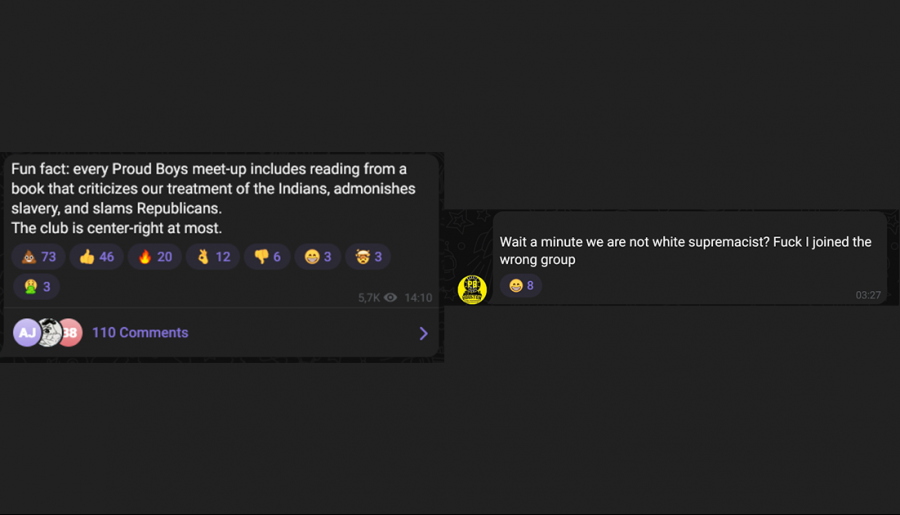
Figure 3. He and some of his followers seem to have somewhat different opinions.
It is essential to point out that this makes sense in his ideological book. As a radical ethnocultural nationalist, it is logical to consider the Proud Boys as not racist (“neutral”) and affirm that they are not right-wing enough. At the same time, if we take a look at the uptake, we can see that some of his followers claim proudly that they are racist/white supremacists. This explains, in a way, why he has been criticized as being weak and light. The conflict is a double-edged sword for him. It is first and foremost culture that matters to him, so everyone embracing American values and culture as superior is welcome.
In this message, he uses LGBTQ+ rights to follow his critique of the collapse of the Western world. That ignores the fact that he has repeatedly shown his rejection of trans rights and has been openly homophobic, which is a classic idea within the new right since both are considered a degeneration that weakens the nation. Now, though, as he explains, the rights of the collective are at risk because of migration. And in this way, he reinforces his idea of the degeneration of Western culture due to immigration.
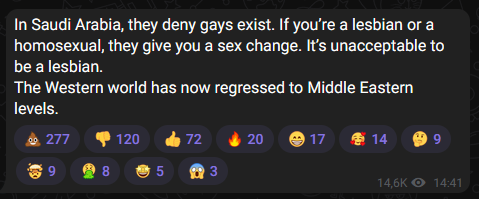
Figure 4. A vague message that is difficult to understand if the context is not analyzed.
As defined by the Southern Poverty Law Center (whom he denounced for defamation), “McInnes plays a duplicitous rhetorical game: claiming to reject white nationalism while espousing a laundered version of popular white nationalist tropes” (SPLC 2019). I argue that this strategy is one of his main metapolitical weapons, adding a bit of humor on most occasions.
According to Maly (2018), metapolitics is an ideological project, a struggle for hegemony. As Maly explained (2018), the concept of metapolitics of Guillaume Faye has been successful among the alt-right. Faye said that the identitarian movement “overlooked the fact that the cultural battle Gramsci promoted was associated with the political and economic battle” (Maly 2018). As one of the heads of the global ‘New Right’ (and former alt-right), this has never escaped McInnes' attention.
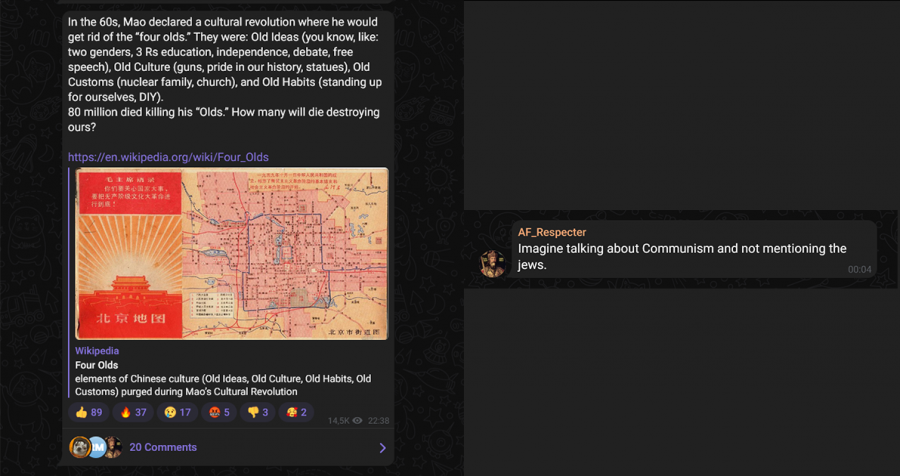
Figure 5. On the right, a comment to the post on the left.
This comment is evidence of his strategy. Although he has never explicitly spoken of the conspiracy of Cultural Marxism, with his 'inoffensive' jokes he keeps helping to build up an ideology. Also, this conspiracy theory, although not explicitly stated, serves to legitimize the anti-Enlightenment nationalist discourse he defends. I will develop this idea in the following section.
If we take a look at the uptake, then, we can see that he stokes fires without encouraging them. He never participates in the comments section and never explains or corrects his jokes in Telegram. This has two consequences: first, he can be up to interpretation, which allows his users to feed back their thoughts, and at the same time that also allows him to have more users, which helps him to normalize his ideas.
The 'anti-woke discourse'
A large part of his discourse revolves around the idea that Western culture is in danger. The thread, in this case, comes from the “leftists”, the “boring feminists” and the “wokes”. Of course, diversity is also one of the main factors. This is inevitably reminiscent of the conspiracy theory of Cultural Marxism.
This notion of decadence (and rebirth) is central to the anti-Enlightenment tradition. This links McInnes' list of ideas to the long history of fascism, which Sternhells (2008) explored. As we discussed before, fascism is an appeal to irrationality, which logically clashes with the principles of the Enlightenment. But this decline is not about the economy or equality. As Sternhell put it, the “fascist ideology represented a synthesis of organic, tribal nationalism with the anti-materialist revision of Marxism” (Sternhell, 2008, p. 282).
Tanner Mirrlees explains (2018, p. 49) that, for almost three decades, “everyone from paleo-conservatives to neo-Nazis” has used the concept “woke”. They use it as a “shorthand for an anti-American bogeyman, a symbol for every liberal or left-leaning group that the right defined itself against, and an epithet for progressive identities, values, ideas, and practices that reactionaries believe have made America worse than before”. This discourse, she explains (2018, p. 50), resonated during Trump's campaign with the “new generation of Internet-savvy white supremacists” and the alt-right, who supported Trump’s race to the White House, just as McInnes did in 2016.
The 'anti-woke culture war', thus, targets the so-called 'social justice warriors'. With his analysis in the UK context, Cammaerts (2022, p. 735) pointed out that "social justice struggles such as anti-fascism, anti-racism and anti-sexism or pro-LGBTQ rights, are also conveniently labelled, stigmatised and bedevilled as an extremist authoritarian, intolerant and above all an ideological and thus contestable position”.
The so-called 'woke ideology', he explains (2022, p 735), is described as “destructive, totalitarian, divisive, negative and anti-democratic”. In these two posts, we can see how the 'woke', on this occasion trans people and LGBT characters, destroyed both the Golden Globes and the 'purity' of Disney. The ‘neutral’, thus ‘non-ideological’, for McInnes, is then the white Western man and the neoliberalism. He never treated these discourses as ideological.
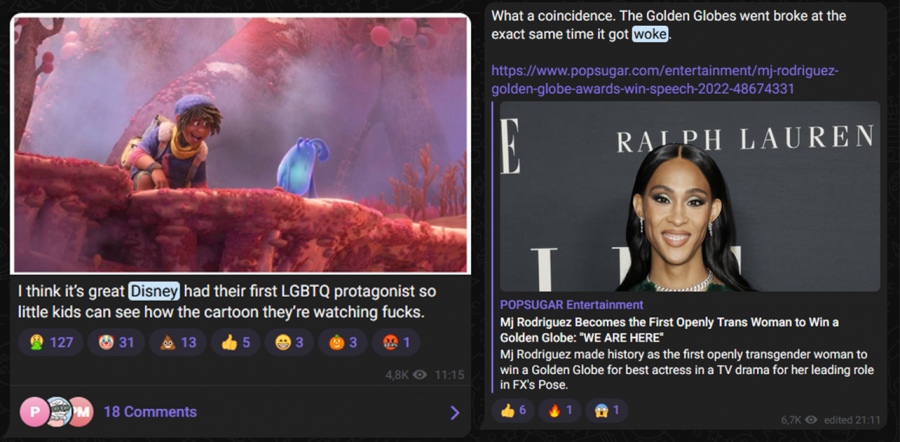
Figure 6. Two examples of the “anti-woke” discourse of Gavin McInnes.
Even though McInnes calls himself “The New Right”, this has nothing new, since his economic vision dates back to the Thatcher-Reagan era, and his socio-political and cultural vision echoes the anti-Enlightenment tradition. Following Fairclough’s analysis of Political Correctness (2003, p. 19), the “cultural turn” and “linguistic turn” in politics explain this phenomenon, which comes from a larger turn – “an increasing salience of culture and discourse in “an increasingly reflexive” social life”, which he defines as “a feature of modernity”. With time, 'woke' becomes a slur, and thus, abnormalized.
We can find a great example of that in the Redneck Manifesto (Jim Goad, 1998). McInnes called Goad “the greatest writer of our generation” and listed this book as one of the three 'required' books on modern Western culture. This book also has a certain degree of acceptance among some sectors of the left. When this book was translated into Spanish in 2018, Pablo Iglesias, leader of the Spanish left party Podemos, praised an article titled “The year the right beat the left in a political essay”.

Figure 7. Pablo Iglesias tweet: “A cruel, lucid, and valuable text by Victor Lenore”
As El Salto pointed out, in an article that criticized the first (Ferrero 2018), Goad has been commended as a “brilliant and scathing critic of the postmodern drift of the Western left” due to the Trump context, and not for what it really is – “a rather mediocre writer with messy ideas”. The idea of the 'classical' working class being abused by the neoliberal elites that he presents is not misguided from an economic point of view (Proyecto Una, 2019). But such a 20-year-old analysis has little to do with the current context.
Here we can see two related phenomena. First, how the anti-Enlightenment discourse has been so successful in the Global New Right, and second, how it has also been very well accepted on the left. It is no coincidence that McInnes extols Goad as a great author because it intertwines perfectly with his 'anti-woke discourse', the anti-materialist revision of Marxism, and the tradition of fascism. Moreover, by accepting the anti-Enlightenment tradition, even if this is due to an "identity" shift in politics, the left does itself a disservice. In this way, the far right and McInnes continue to push the agenda and normalize and abnormalize ideas.
Thus, as Fairclough pointed out (2003), Political Correctness (or the 'woke culture') is also considered one of the factors causing the division on the left. An interesting twist that allows, in fact, the ‘New Right’ members, such as McInnes, to elevate themselves as the voice of the people, those who stand up for the real problems of the working class. The reality, though, is completely different.
In this sense, McInnes also needs to create twisted messages using facts or news to further elevate its position. As we have seen before, McInnes is able to turn reality upside down in order to keep his 'anti-woke discourse' intact. In these two messages, the commentator takes the Johny Depp case out of context in order to put gender violence and the fight for trans rights, which is effectively a fight against gender as such, on the same level. In the current patriarchal context, this makes no sense. In his book of ideas, however, it does. He uses a similar strategy in the post of the right.
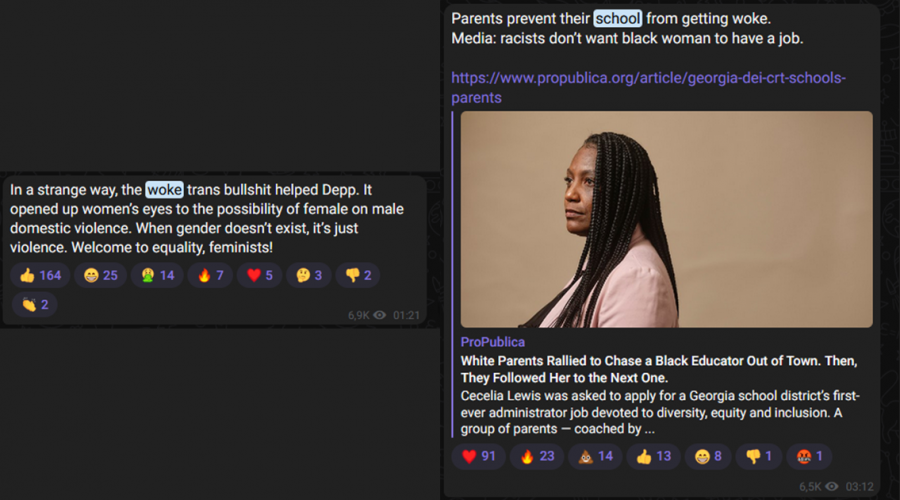
Figure 8. Two examples of conscious misinformation and manipulation.
The “rebel” and the underdog: group cohesion
All the strategies McInnes uses require a larger one. One that preserves everything and unites all his fans. This consists of the image of a 'social underdog' and 'countercultural appeal', which Rebecca Lewis (2018) described so well in her report ‘Alternative Influence: Broadcasting the Reactionary Right on YouTube’.
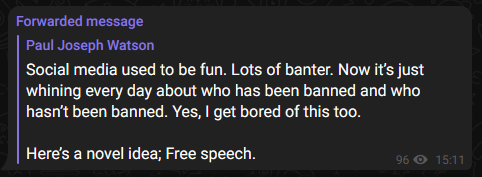
Figure 9. Repost of Paul Joseph Watson, a British far-right YouTuber.
In this repost, we can see how McInnes and his circle position themselves as victims of social media and the cancel culture — if there is such a thing. Not because what they say is hurtful or directly dangerous to democracy, but because ‘they’ do not respect their ideas which they could once share freely.
This shift to positioning themselves as victims of the system work for McInnes and his fans as group cohesion. This in turn has a weak point, since it establishes a niche and does not work on a large scale. Yet, establishing this niche contributes to radicalization and allows them to raise their voice and be heard by people outside this circle. They get to set the political agenda, and when someone proves their facts wrong, they have the perfect ability to rise themselves as victims of an "establishment" that is after them and seeks to cancel them out (Wodak, 2015).
Beyond this, Lewis (2018) proved that this social identity also “helps them build influence and attract audiences”. What is more, “they purposely craft a shared identity based on hipness and edginess, and they signify a countercultural identity that largely draws from youth movement in the past” (Lewis, 2018, p. 22).
Lewis exemplifies this with the typical discourse of conservatives of “embarrassment or shaming that comes along with admitting one’s political views publicly” (Lewis, 2018, p. 21). In this post, with a rather macabre twist, the right wing is the victim and the persecuted, to the point of going to extremes such as suicide.
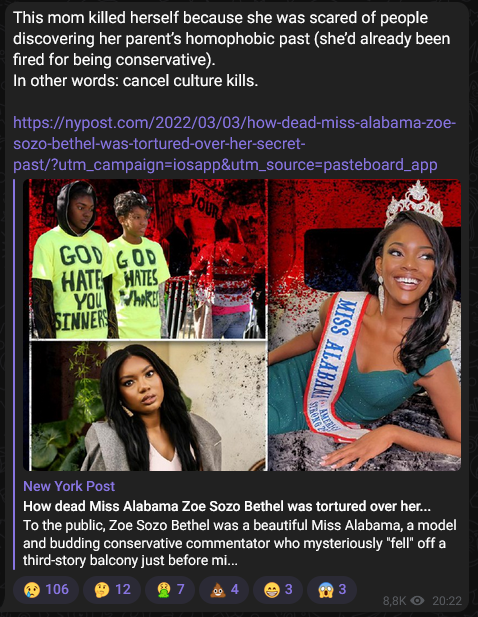
Figure 10. Another big twist, and a good example of the instrumentalization of the facts.
As has already been said, all this made-up imagery serves as a group cohesion for McInnes’ fanbase. With this approach, he elevates himself as the voice of the silenced, the rebel against cancel culture. This is one of the metapolitical weapons that work best for McInnes in the “influpolitics” (Ramírez & Gómez, 2022) context in which we live, as it allows him to rise as someone courageous to follow and admire.
The Lewis’ Alternative Influence Network: friends and co-militants
Lewis (2018) locates McInnes inside what she calls the 'Alternative Influence Network' (AIN). The AIN is “a network of controversial academics, media pundits, and internet celebrities who use YouTube to promote a range of political positions from mainstream versions of libertarianism and conservatism to overt white nationalism” (Lewis, 2018, p. 10).
These YouTubers are “less defined by any single ideology” than by what they oppose (Lewis, 2018, p. 8). Even so, many of them do not start just from a reactionary position, but share the desire for a new modernity, as McInnes’ Hipster movement and the concept and ideas of “The New Right” demonstrate. They also share two other basic principles: all of them seem to subscribe to the anti-Enlightenment tradition, as we have seen, and claim to have taken the red pill – a widely known, and misused, allusion to the movie The Matrix.
This network is of crucial importance for McInnes. His platform Censored.TV is built on, first, his persona, but second, a big network of alliances and collaborations with other American far-right celebrities.
As Lewis puts it, the AIN “provides a pathway for the radicalization of audience members and content creators alike” (Lewis, 2018, p. 35) because they expose the audiences, and themselves, to alternative frameworks. Bearing in mind how algorithms work, these new frameworks are likely to be more radical, since algorithms reward popularity as it benefits the platform (Maly, 2021), and generate eco chambers (Cinus et al., 2022).
The hate culture and the benefits of a hybrid media system
The fact that McInnes often takes a public stand more for what he opposes and hates than for what he defends is very useful for him. This is because it appeals to a large mass of people, and in the process avoids sinking into deeper ideological discussions that can lead to disagreements with its supporters. Meanwhile, his discourse is gradually gaining ground. For him, the wicked are the Other, the 'social justice' warriors that have ideologized and perverted society, which is 'no longer as it was’. As I have discussed before, much of the ‘New Right’ does not start from just a reactionary point of view, but seeks a new modernity. Yet, their strategy is nothing new. As the analysis of Fairclougs’ anti-PC discourse (2003) demonstrates, they often align themselves on the side of the old and lifelong conservatives.
The big change here is the medium, which is the reason why McInnes remains relevant. He knows perfectly how to use a digital language and how digital communities work. The algorithmic activism (Maly 2019) he practices, requires digital literacy and a very premeditated strategy. That is the reason why I argue that his apparent nonchalance and chaos are far from improvised. He understood perfectly what he needed to do in order to remain relevant, after a clear loss of popularity due to the monster that he himself generated, the Proud Boys, and from which he had to turn away. First, it was a hindrance to his business as a comedian and commentator. And second, it was a false step. It was too provocative and hurtful to democracy to allow it to wage its slow but intense war for hegemony. In short, it brought all its true intentions to light. Yet that didn't stop him, as we have seen throughout the article. McInnes takes full advantage of the hybrid media system and serves a product that appeals to a wide range of people: podcasts and videos in a TV format (“old media”) in an online platform and different social media platforms (“new media”).
With all these strategies McInnes has managed to remain relevant, and we could consider his metapolitical battle as one of the most fruitful. We are talking about one of the most beloved figures of the manosphere (Proyecto Una 2019) who has hundreds of thousands of subscribers across all his social networks. And, in the process, he has also managed to ensure that such barbarity as the Redneck Manifesto finds acceptance on the left.
References
Cammaerts, B. (2022). The abnormalisation of social justice: The ‘anti-woke culture war’ discourse in the UK. Discourse &Amp; Society, 33(6), 730–743.
Cinus, F., Minici, M., Monti, C., & Bonchi, F. (2022). The Effect of People Recommenders on Echo Chambers and Polarization. Proceedings of the International AAAI Conference on Web and Social Media, 16, 90–101.
Fairclough, N. (2003). ‘Political Correctness’: the Politics of Culture and Language. Discourse & Society, 14(1), 17-28.
Lewis, R. (2018). Alternative Influence: Broadcasting the Reactionary Right on Youtube. Data & Society.
Maly, I. (2018). Populism as a mediatized communicative relation: The birth of algorithmic populism. (Tilburg Papers in Culture Studies; No. 213).
Maly, I. (2019). New Right Metapolitics and the Algorithmic Activism of Schild & Vrienden. Social Media + Society, 5(2).
Maly, I. (2021, January 21). Ideology and algorithms. IDEOLOGY THEORY PRACTICE.
Maly, I. (2022). Guillaume Faye’s legacy: the alt-right and Generation Identity. Journal of Political Ideologies.
Mirrlees, T. (2018). The Alt-right’s Discourse on “Cultural Marxism”: A Political Instrument of Intersectional Hate. Atlantis: Critical Studies in Gender, Culture & Social Justice, 39(1), 49–69.
Proyecto Una. (2019). Leia, Rihanna & Trump. De cómo el feminismo ha transformado la cultura pop y de cómo el machismo reacciona con terror (1.a ed.). Descontrol Editorial.
Sternhell, Z. (2008). How to Think about Fascism and its Ideology. Constellations, 15(3), 280–290.
Wodak, R. (2015). The Politics of Fear: What Right-Wing Populist Discourses Mean (1st ed.). SAGE Publications Ltd.